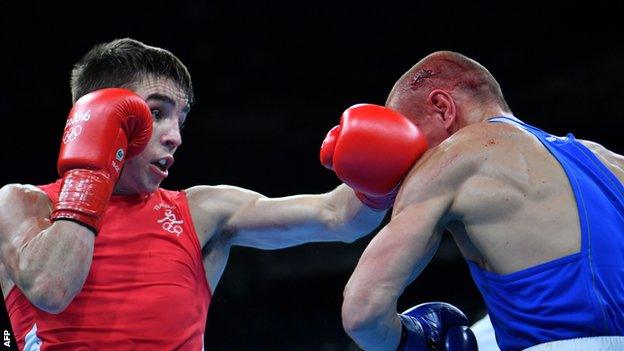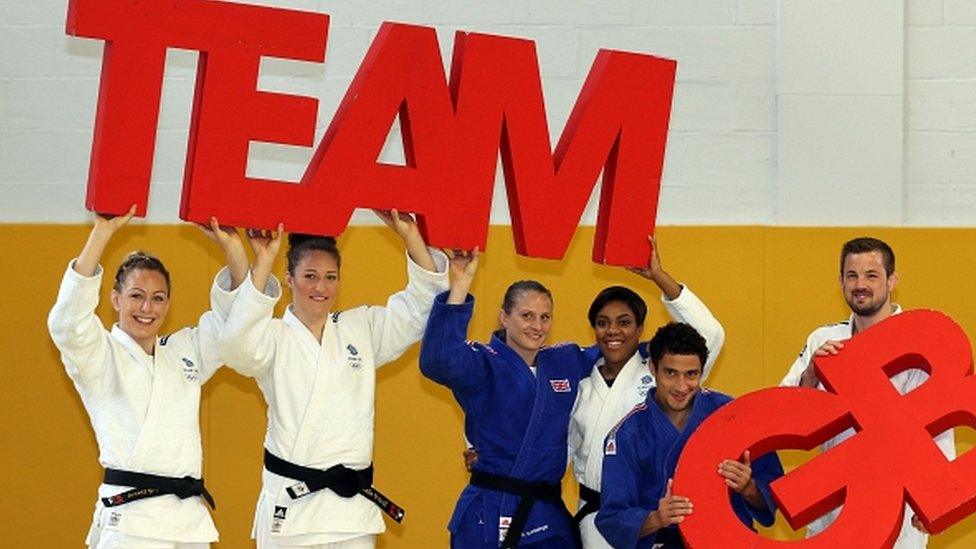Rio Olympics 2016: Boxing judges are 'crazy' over new scoring system
- Published

Conlan (left) lost controversially to Nikitin in Tuesday's quarter-finals
Olympic boxing judges in Rio are "confused" by a new scoring system and have gone "crazy", leading to controversial decisions which have marred the Rio tournament, according to BBC boxing expert Steve Bunce.
Kazakhstan's Vassiliy Levit and Ireland's Michael Conlan lost bouts in they both appeared to win comfortably.
Under new rules, they cannot appeal against the judges' decision.
Bunce said the judges will "not work again at these Olympics".
"What happened to Conlan and Levit is heartbreaking and wrong," he said.
"After 200-odd bouts and 11 days of boxing, we have seen two absolute stinkers.
"Appeals were dropped for this tournament and that creates a bit of a problem. At least two decisions would have been appealed and overturned.
"They are semi-isolated but we are in the medal stages - that's when the judges start going crazy."
What happened?
Russian world champion Evgeny Tishchenko was booed by the crowd after his unanimous points win over Levit in the men's heavyweight final on Monday.
Tishchenko suffered a cut to his head and spent most of the bout on the back foot, but the judges scored all three rounds in his favour.
On Tuesday, Belfast bantamweight Conlan lost by unanimous decision to Russia's Vladimir Nikitin in the quarter-finals.
World, European and Commonwealth champion Conlan was awarded the second round, but the first and third rounds went to Nikitin despite Conlan appearing to win them.
"My dream has been shattered. It's been robbed," said Conlan.
How does the scoring work?
The International Boxing Association (AIBA) has changed several rules for Rio 2016, allowing professionals to compete, removing the headguard, scrapping the appeals process and changing the scoring system.
Five officials judge each bout and a computer randomly selects three whose scores are counted.
Traditionally, judges would use a computer scoring system to count each punch.
But now the winner of each round is awarded 10 points and the loser a lower number, based on a criteria which includes the quality of punches landed, effective aggression and tactical superiority.
So what has gone wrong?
"They have changed the scoring after 36 years," said Bunce. "Instead of one person pushing a button, the judges are now sitting at ring side and making a judgement.
"Perhaps the judges are as confused and bewildered as the people in the arena and on TV.
"There is a roster of 60 judges here in Rio. Everyone knows who they are and those six judges will not work again at these Olympics."
Olympic bronze medallist Richie Woodhall added: "This new system of scoring awards points on good defensive skills and going forward, whereas with the other system the judges would press a button when a punch was landed.
"Now the judge refers to the style of boxing. Conlan showed he could box on the front and back foot and he did not get it - it was a poor decision."
What does the AIBA say?
Conlan said: "I came for gold and I've been cheated."
However, Tom Virgets, a member of the AIBA executive committee, said the governing body was concerned by the result of Conlan and Levit's fight.
"We have a lot of educating and evaluating to do," Virgets told BBC Sport.
"We are getting better but Rome ain't built in a day. Along the way we have to constantly sharpen the blade with our officials.
"We are changing them from being robots who press a button to being analysts of a bout."
The Irish Athletic Boxing Association has called for a review of the scoring process.
"It is in the best interests of amateur Olympic boxing that the scoring and judging process is reviewed," read an IABA statement.
"We will look to work with other national federations and AIBA to ensure that this happens."
Subscribe to the BBC Sport newsletter, external to get our pick of news, features and video sent to your inbox.
- Published16 August 2016

- Published16 August 2016

- Published18 August 2016

- Published3 August 2016

- Published19 July 2016

- Published3 August 2016
